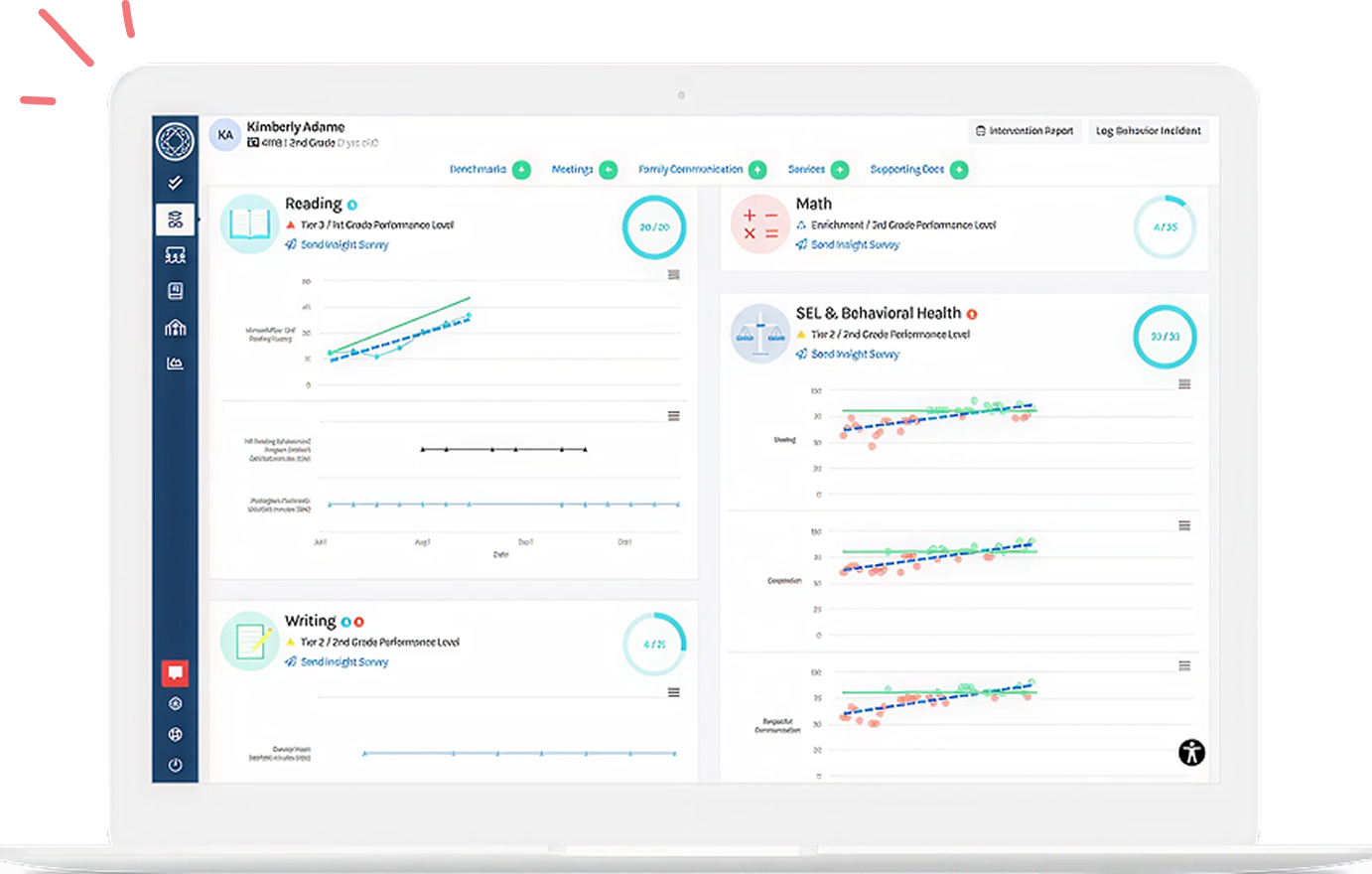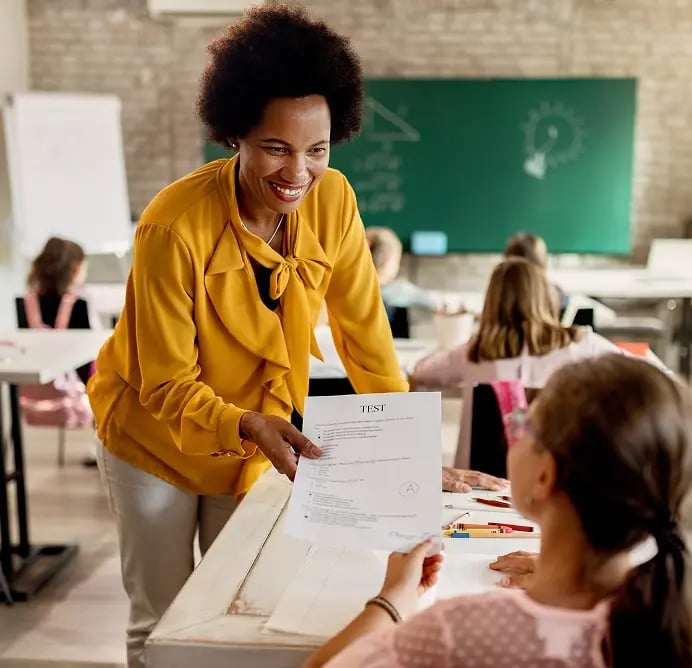When creating a comprehensive MTSS support or intervention plan, it’s important to note that literacy interventions need to incorporate both reading and writing. Reading skills help develop a student’s ability to comprehend ideas communicated by another writer, while writing allows a student to develop and communicate their own thoughts. While these are two very different skills, they each impact the growth of the other, and intervention plans will need to account for both reading and writing support.
Research-Based Interventions for Writing Key Takeaways
- Writing needs dedicated support. Don’t rely on reading programs alone—writing instruction is essential in MTSS.
- Free strategies work. Graphic organizers, writing conferences, and mnemonics are simple, effective, and research-backed.
- Programs boost impact. Tools like NoRedInk and ThinkCERCA offer targeted support, especially for ELLs.
Below, we outline six research-based writing interventions for RTI/MTSS. We offer a range of support options, from free strategies to paid programs, tailored to address the diverse needs of each school and student. These RTI/MTSS Writing Interventions are available in the Branching Minds Library, the most robust library of evidence-based learning supports and interventions across academics, behavior, and SEL.
Writing Conferences
Writing conferences are a free, research-based writing activity for grades 3-8, and appropriate for all Tier levels in MTSS. They’re conducted in a whole-class setting and allow students to share and reflect on their own writing throughout the revision process. Writing conferences also allow immediate feedback from teachers and peers, clarification of questions, promotes positive attitudes regarding writing and topics, and incorporate social benefits such as peer-sharing and collaboration. Research shows that writing conferences can significantly improve comprehension and application of revision and editing during the writing process.
When planning a writing conference, it’s essential to outline a clear goal for students to achieve. Teachers model the process before beginning, create a structure to focus on discussion and revision, and demonstrate solutions to problems encountered. Students may be paired or placed into groups for role-reversal in peer editing, allowing additional social support throughout the intervention.
Graphic Organizers
Graphic organizers are a free, research-based writing strategy for grades K-12 that is appropriate for all tier levels. Although various organizers, the root of this strategy remains the same.
Organizers help students break down complex texts into manageable chunks and construct meaning from what they have read. When incorporated at the beginning of the writing process, organizers help students compile their thoughts before putting pen to paper (or finger to keyboard in this modern age).
Graphic organizers are beneficial for students struggling with reading comprehension and memory. Research has shown that graphic organizers effectively improve narrative and expository writing skills, particularly in students with learning disabilities. Teachers can model how to fill out a graphic organizer while reading complex texts and scaffold as needed, as students complete the organizer independently or in small groups.
The Branching Minds Library has a wide selection of free graphic organizers available for teachers at all grade levels and writing selections.
💡 Related Resource: Audit Intervention Programs in MTSS/RTI
Mnemonic Devices
Mnemonic devices are a free, research-based writing strategy appropriate for K-8, with some adaptability available for higher grade levels. While suitable for all tier levels, mnemonic devices are handy for higher-tier students who struggle with memory recall.
As a writing tool, mnemonic devices can intervene in grammar and spelling for struggling writers. The common phrase “i after e, except after c” is an example of how spelling mnemonics can help students remember complex spelling structures (though, as we all know, these rules are not always true). Expression mnemonic devices are effective for students who struggle to write homophones or conjunctions, utilizing popular expressions such as FANBOYS (For, And, Nor, But, Or, Yet, So) to aid memory recall while writing.
Research has demonstrated a link between mnemonic devices and increased student accuracy in word recall, spelling, and grammar conventions. Mnemonic devices can be utilized throughout the writing process. Still, before applying this strategy, teachers should note specific areas of difficulty in writing, such as spelling, information recall, or grammar rules.
Step-Up to Writing
Step-Up to Writing is a paid writing program that offers a robust curriculum for students K-12. This program, an offshoot of Voyager Sopris Learning, this program is similar to Voyager’s many other learning programs. The program includes professional development, flexible implementation, curriculum compatibility, and subject-area writing support.
The program establishes a common writing approach across four grade bands: K-2, 3-5, 6-8, and 9-12. The online content supports narrative, informative, and argumentative writing and provides additional support for English language learners. The program’s structure allows for small and whole-group instruction, allowing the flexibility to incorporate the program in entire units or in smaller chunks to complement classroom instruction.
Preliminary research has shown that Step-Up is successful in helping students gain mastery in summarization, expository writing, syntax, essay organization, and grammar conventions. This places Step-Up solidly in the “Research-Based” category of ESSA’s levels of evidence.
📕 Guide: MTSS Intervention Process Flowchart: A How-To Guide
NoRedInk
NoRedInk is a paid writing program appropriate for grades 5-12. One of the newest members of writing interventions, NoRedInk, offers a comprehensive online platform for adaptive writing lessons based on student interests and skills. An initial diagnostic assessment determines reading material that categorizes student interests in different genres to generate texts of high interest to the individual reader.
This program offers various options for integration into the classroom, including daily writing activities, full curriculum units, targeted grammar exercises, and test prep. Teachers can select activities from the assignment library based on the needs of each student, with support available for English Language Learners (ELLs).
ThinkCERCA
ThinkCERCA is a paid, research-based close reading and writing platform for grades 3-12, and appropriate for all Tier levels in MTSS. ThinkCERCA’s units include resources to support routines covering background knowledge and conceptual understanding to improve comprehension, close reading practices such as highlighting and annotating text, and pre-writing routines, including summarizing, planning with graphic organizers, peer editing, and revision. Additional direct instruction and skills lessons allow teachers to target personalized skill development.
ThinkCERCA’s implementation resources support literacy routines that allow teachers to work with small groups and individual students. ThinkCERCA meets ESSA’s levels of evidence, showing that students see 2+ years of reading growth and 20% gains in writing when they use it with fidelity.
Supporting Student Writers Through MTSS
Many factors should be considered when building a writing intervention plan. Students struggle with writing for various reasons. An effective and efficient MTSS support plan should include targeted instruction, high-interest material, and a comprehensive scope of the whole student, not just the intervention area.
This is particularly true in terms of English Language Learners (ELLs). When planning writing interventions for ELL students, it’s important to consider each student’s comfort with language acquisition, and priority should be given to developing reading levels. Research supports more minor writing activities for entering ELL students—daily news reports, dialogue journals, and short, persuasive essays. Many strategies and programs outlined above provide additional support for ELL students and could be beneficially added to intervention plans in MTSS.
💡 Blog: Supporting English Learners within MTSS
![[Guest Author] Mollie Breese-avatar](https://www.branchingminds.com/hs-fs/hubfs/Team/Mollie%20Breese%20Headshot-1-1-2-1.jpeg?width=82&height=82&name=Mollie%20Breese%20Headshot-1-1-2-1.jpeg)
About the author
[Guest Author] Mollie Breese
Mollie Breese is the former Content Manager at Branching Minds. She helped streamline the support library, so schools can identify and access the interventions they need to support student success. She researched the newest strategies, activities, and programs to add to the robust library, providing a wealth of resources for partner schools. Prior to joining Branching Minds, Mollie worked in the classroom as an English teacher, Reading teacher, and ESL instructor. Mollie earned her B.A. in Political Science from the University of Missouri, and her M.A. in English Literature from the University of Glasgow.

Empower Student Success
Support students at every level with Branching Minds—your partner in delivering targeted, effective interventions through a streamlined MTSS approach.














.png?width=716&height=522&name=Tier%203%20Behavior%20Support%20Planning%20(preview).png)
.png?width=716&height=522&name=Understanding%20Literacy%20Basics%20(Preview).png)
